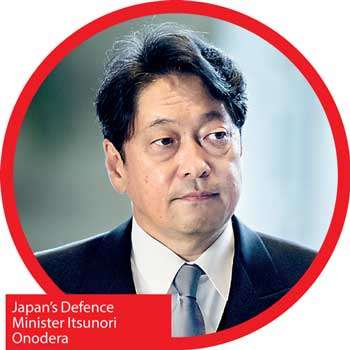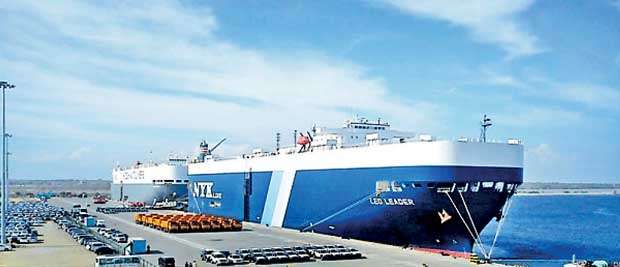Reply To:
Name - Reply Comment
Last Updated : 2024-04-26 19:49:00
 Last week, the Japanese Defence Minister was in Sri Lanka on a two-day visit, a first by a Japanese politician of that capacity to the island. Pacifist Japan did not have a habit of sending their defence top brass and warships to every other country, until very recently. In the same week, the Japanese naval ship “Ikazuchi” arrived in the Trincomalee harbour on a goodwill visit. The vessel was part of a dispatch of three ships sent on a month-long tour to India, Sri Lanka, Singapore, Indonesia and the Philippines; a modest manoeuvering by Tokyo to assert the maritime role, as China is expanding its influence in the region.
Last week, the Japanese Defence Minister was in Sri Lanka on a two-day visit, a first by a Japanese politician of that capacity to the island. Pacifist Japan did not have a habit of sending their defence top brass and warships to every other country, until very recently. In the same week, the Japanese naval ship “Ikazuchi” arrived in the Trincomalee harbour on a goodwill visit. The vessel was part of a dispatch of three ships sent on a month-long tour to India, Sri Lanka, Singapore, Indonesia and the Philippines; a modest manoeuvering by Tokyo to assert the maritime role, as China is expanding its influence in the region.
During his visit Defence Minister Itsunori Onodera toured all three major ports, Colombo, Hambantota and Trincomalee, a gesture one would feel a bit too intrusive, and later he told Japan’s NHK television, that Tokyo expects that the Hambantota port would be free of military activities. Japan’s emphasis on a ‘free and open’ Indo Pacific is rooted in much more than the freedom of navigation, Tokyo’s own rivalry with China over the contested Diaoyu/Senkaku islands and China’s expansive maritime posture in the region - according to some estimates China is building a 300 vessel strong fleet with 75 submarines which could contest American superiority in the region. Japan’s interest in Sri Lanka coincides with Japan’s own security interests, emanating from China’s rise, and the expansion of the Chinese influence in the region. The rising China is espousing revisionist grievances, simultaneously, while exerting its influence through an unrivaled infrastructure building binge across the world. It is coaxing countries with its cheque book, at the same time bullying others who refused to kowtow. China’s rise and still untested intentions generate reactions from regional states, mainly India and Japan and reigning super power, America.
Their collective response towards China has evolved into a soft balancing strategy of sort. Some other countries such as Vietnam and at times, Philippines and Singapore are playing a complementary role. Soft balancing is a mixture of collective security measures such as ad hoc military exercise, security partnerships, intelligence sharing, and collective behaviour at international forums built on shared strategic interests. Those measures can be converted into more overt hard balancing strategies of kinetic display if the security uncertainties in the international system heat up.
However, with the presidency of Mr. Trump, who has a special penchant for picking fights with both allies and foes, and debasing and humiliating America’s treaty partners, Japan, for the first time since the World War II, has to find its own security. Recently, Japan was a mere observer of Mr. Trump’s romance with North Korean dictator Kim Jong Un. Now that the American president has reinforced sanctions on Iran, Japan which had geo-strategic interest in taking part with India in the development of Iran’s Chabahar port, which in someways is a rival for the Chinese funded Gwadar port, finds its strategic concerns are in conflict with mercurial Mr. Trump.
 Japan has pinned hopes on India as a counterweight to China, and has been a permanent member of the Malabar naval exercise, also involving America to which it sent its largest helicopter carrier last year. Japan and India have also offered an alternative to China’s one belt one road strategy. Dubbed Asia-Africa growth corridor, the Indian and Japanese economic balancing initiative aims to build, just like OBOR, an infrastructure corridor, facilitating connectivity in the region. Though the intention has been to cynic Japan’s technological sophistication with India’s scale, the initiative has made little headway, and is more likely to be a victim of inherent bureaucratic lethargy in India, and economic pickiness of Japan.
Japan has pinned hopes on India as a counterweight to China, and has been a permanent member of the Malabar naval exercise, also involving America to which it sent its largest helicopter carrier last year. Japan and India have also offered an alternative to China’s one belt one road strategy. Dubbed Asia-Africa growth corridor, the Indian and Japanese economic balancing initiative aims to build, just like OBOR, an infrastructure corridor, facilitating connectivity in the region. Though the intention has been to cynic Japan’s technological sophistication with India’s scale, the initiative has made little headway, and is more likely to be a victim of inherent bureaucratic lethargy in India, and economic pickiness of Japan.
Also during the last week, an American naval ship, one of the many that came recently, arrived in Trincomalee port for a joint exercise. Those visits though modest are part of a broader American strategy to deepen its footprint in Asia Pacific, which it has re-christened as Indo-Pacific to highlight the strategic importance in the Indian Ocean region. Sri Lanka cannot insulate itself from these systemic forces. They take their own course, with or without our participation. The only difference would be, if you shun systemic forces, you deprive yourself even the remotest possibility to make use of them to advance one’s interests.
Some local commentators tend to view this increased international attention as a disturbance to our idyllic solitude. Foreign policy pundits describe the government policy as an aberration of the traditional foreign policy of non-alignment. Naysayers warn that the government is auctioning strategic assets to foreign powers. Others forewarn Sri Lanka would become a Chinese colony. And no surprise, there are enough fools in this country to believe all of that.
There are two ways to view the on-going power transition and fickle systemic conditions courtesy of China’s meteoric rise.
Naysayers and traditional non-aligned types see a danger in this systemic uncertainty. Others of the realist pragmatism sense an opportunity . Sri Lanka should listen to the latter type. Unfortunately, we and many countries of similar cultural and colonial heritage are full of the former, who espouse the old garbage of an insular and reactive foreign policy as received wisdom . This foreign policy tradition which often went hand in glove with a far more disastrous economic policy of statism, sometimes dubbed a middle path, was the bane of much of the post independent colonial states. Their leaders from Nehru to Kenneth Kaunda, to Sirimavo, build a larger than life personal image at the expense of their countries, and left their people swollen bellied, miserable, often living in hand-to-mouth off the American food aid.
However, the long association of this outlook with foreign service officials, politicians, and academia plus the inherent poverty of that ideology to reform, have blinded the foreign policy of those countries. Thus the rot is self-regenerating.
On the other hand, countries such as South Korea, Taiwan, Singapore, Chile, that exploited those systemic conditions of the cold war, have not only secured their security, but also economic prosperity.
China’s rise has also created unparalled systemic opportunities, unseen since the hey days of the cold war of the 1960s. And unlike the cold war rivalry, where two distinctive ideologies were at logger heads, the difference in the unfolding competition is much more nuanced. Liberal market policies have prevailed over the rest. And China is not keen on exporting its brand of political system. Its expansion is subtle and is primarily economic, though economic power is generally the reservoir of all other forms of power resources.
China wants the countries to acknowledge its new found clout, and is willing to pay in gold for their solidarity - though its unremitting loan tap itself has created a debt trap when it is unleashed on states which lack internal economic accountability, like ex-President Mahinda Rajapaksa’s vestige projects have proved to be.
However, it was also Mr. Rajapaksa who decisively exploited the systemic opportunity when it just emerged. Without that manoeuvering, we could still be looking for a lender for the Katunayake Expressway or the Southern Expressway.
It was also the Chinese interest in the island, and later the leasing of the Hambantota Port, that generated the international attention and their desire to pro-actively engage with Sri Lanka. Otherwise, this country was a backwater which, nobody cared. That lack of interest was hardwired to our proximity to India and India’s extended interest in its sphere of influence which none of the other major powers wanted to contest. However, for most part of its recent history, India has been abysmally poor, and not only did it reign over a sphere of partly self- inflicted poverty, it also prevented other countries from escaping poverty, as the Indian funded insurgency did to Sri Lanka just after Colombo embraced free market economic policies.
The rising China is espousing revisionist grievances, simultaneously, while exerting its influence through an unrivaled infrastructure building binge across the world.
Mr. Rajapaksa broke that mould, and since then the Sri Lankan foreign policy has been much bolder.
This does not mean that Sri Lanka should bandwagon with China. Nor does it, that it should shun the American, Indian or Japanese strategic interests in the island. The current power competition is nuanced to the extent that Sri Lanka can pick and choose where it can cooperate and where it would not. At the end, the emerging China-led economic system, if it ever materializes, would have more in similarity with the prevailing US led system than differences. Both are rooted in the free trade -- though China’s implementation of that may be problematic, those aberrations are more likely to wither way as the country socializes with the trading systems.
Sri Lanka should also not overstate its strategic significance. Strategic importance of small countries is only to the extent that they are willing to play a role in the strategic power play. Sri Lanka should play that role with its long term national interest in mind. National interest for a country like Sri Lanka is first and foremost of its long-term economic wellbeing. Imaginary security implications of such economic interests should not be exaggerated. In the current international system, sovereignty is, by and large, given. Whereas, economic prosperity should be acquired through hard work and ingenuity.
The greatest challenge for Sri Lanka in exploiting those systemic conditions to advance its national interest, is other than the Indian sensitivities, is its own internal lethargy and discord. Sri Lanka has failed to exploit the opportunities of trade integration. Proposed free trade agreements are mired in protracted and often pointless negotiations. Land acquisition and regulatory approval for infrastructure projects are painstaking to obtain. The government has failed to create a predictable environment for investment. Instead, it has gone back on a number of large-scale agreements, and has shown a serial addiction to re-negotiate agreements for an umpteenth time. Unless the country fixes this rotten internal system, Sri Lanka is more likely to be a mere observer of the current flow of systemic opportunities.

Naysayers and traditional non-aligned types see a danger in this systemic uncertainty. Others of the realist pragmatism sense an opportunity . Sri Lanka should listen to the latter type. Unfortunately, we and many countries of similar cultural and colonial heritage are full of the former, who espouse the old garbage of an insular and reactive foreign policy as received wisdom . This foreign policy tradition which often went hand in glove with a far more disastrous economic policy of statism, sometimes dubbed a middle path, was the bane of much of the post independent colonial states. Their leaders from Nehru to Kenneth Kaunda, to Sirimavo, build a larger than life personal image at the expense of their countries, and left their people swollen bellied, miserable, often living in hand-to-mouth off the American food aid.
However, the long association of this outlook with foreign service officials, politicians, and academia plus the inherent poverty of that ideology to reform, have blinded the foreign policy of those countries. Thus the rot is self-regenerating.
On the other hand, countries such as South Korea, Taiwan, Singapore, Chile, that exploited those systemic conditions of the cold war, have not only secured their security, but also economic prosperity.
China’s rise has also created unparalled systemic opportunities, unseen since the hey days of the cold war of the 1960s. And unlike the cold war rivalry, where two distinctive ideologies were at logger heads, the difference in the unfolding competition is much more nuanced. Liberal market policies have prevailed over the rest. And China is not keen on exporting its brand of political system. Its expansion is subtle and is primarily economic, though economic power is generally the reservoir of all other forms of power resources.
China wants the countries to acknowledge its new found clout, and is willing to pay in gold for their solidarity - though its unremitting loan tap itself has created a debt trap when it is unleashed on states which lack internal economic accountability, like ex-President Mahinda Rajapaksa’s vestige projects have proved to be.
However, it was also Mr. Rajapaksa who decisively exploited the systemic opportunity when it just emerged. Without that manoeuvering, we could still be looking for a lender for the Katunayake Expressway or the Southern Expressway.
It was also the Chinese interest in the island, and later the leasing of the Hambantota Port, that generated the international attention and their desire to pro-actively engage with Sri Lanka. Otherwise, this country was a backwater which, nobody cared. That lack of interest was hardwired to our proximity to India and India’s extended interest in its sphere of influence which none of the other major powers wanted to contest. However, for most part of its recent history, India has been abysmally poor, and not only did it reign over a sphere of partly self- inflicted poverty, it also prevented other countries from escaping poverty, as the Indian funded insurgency did to Sri Lanka just after Colombo embraced free market economic policies.
Mr. Rajapaksa broke that mould, and since then the Sri Lankan foreign policy has been much bolder.
This does not mean that Sri Lanka should bandwagon with China. Nor does it, that it should shun the American, Indian or Japanese strategic interests in the island. The current power competition is nuanced to the extent that Sri Lanka can pick and choose where it can cooperate and where it would not. At the end, the emerging China-led economic system, if it ever materializes, would have more in similarity with the prevailing US led system than differences. Both are rooted in the free trade -- though China’s implementation of that may be problematic, those aberrations are more likely to wither way as the country socializes with the trading systems.
Sri Lanka should also not overstate its strategic significance. Strategic importance of small countries is only to the extent that they are willing to play a role in the strategic power play. Sri Lanka should play that role with its long term national interest in mind. National interest for a country like Sri Lanka is first and foremost of its long-term economic wellbeing. Imaginary security implications of such economic interests should not be exaggerated. In the current international system, sovereignty is, by and large, given. Whereas, economic prosperity should be acquired through hard work and ingenuity.
The greatest challenge for Sri Lanka in exploiting those systemic conditions to advance its national interest, is other than the Indian sensitivities, is its own internal lethargy and discord. Sri Lanka has failed to exploit the opportunities of trade integration. Proposed free trade agreements are mired in protracted and often pointless negotiations. Land acquisition and regulatory approval for infrastructure projects are painstaking to obtain. The government has failed to create a predictable environment for investment. Instead, it has gone back on a number of large-scale agreements, and has shown a serial addiction to re-negotiate agreements for an umpteenth time. Unless the country fixes this rotten internal system, Sri Lanka is more likely to be a mere observer of the current flow of systemic opportunities.
Follow @RangaJayasuriya on Twitter

Add comment
Comments will be edited (grammar, spelling and slang) and authorized at the discretion of Daily Mirror online. The website also has the right not to publish selected comments.
Reply To:
Name - Reply Comment
US authorities are currently reviewing the manifest of every cargo aboard MV
On March 26, a couple arriving from Thailand was arrested with 88 live animal
According to villagers from Naula-Moragolla out of 105 families 80 can afford
Is the situation in Sri Lanka so grim that locals harbour hope that they coul